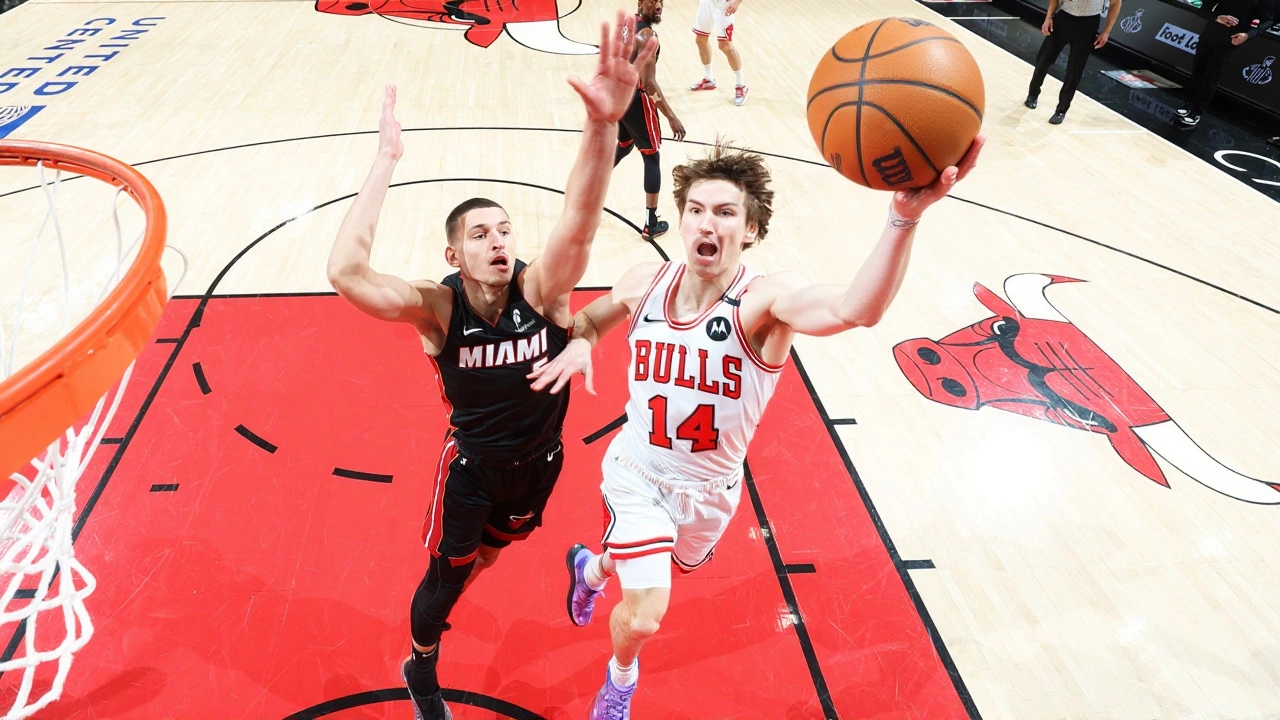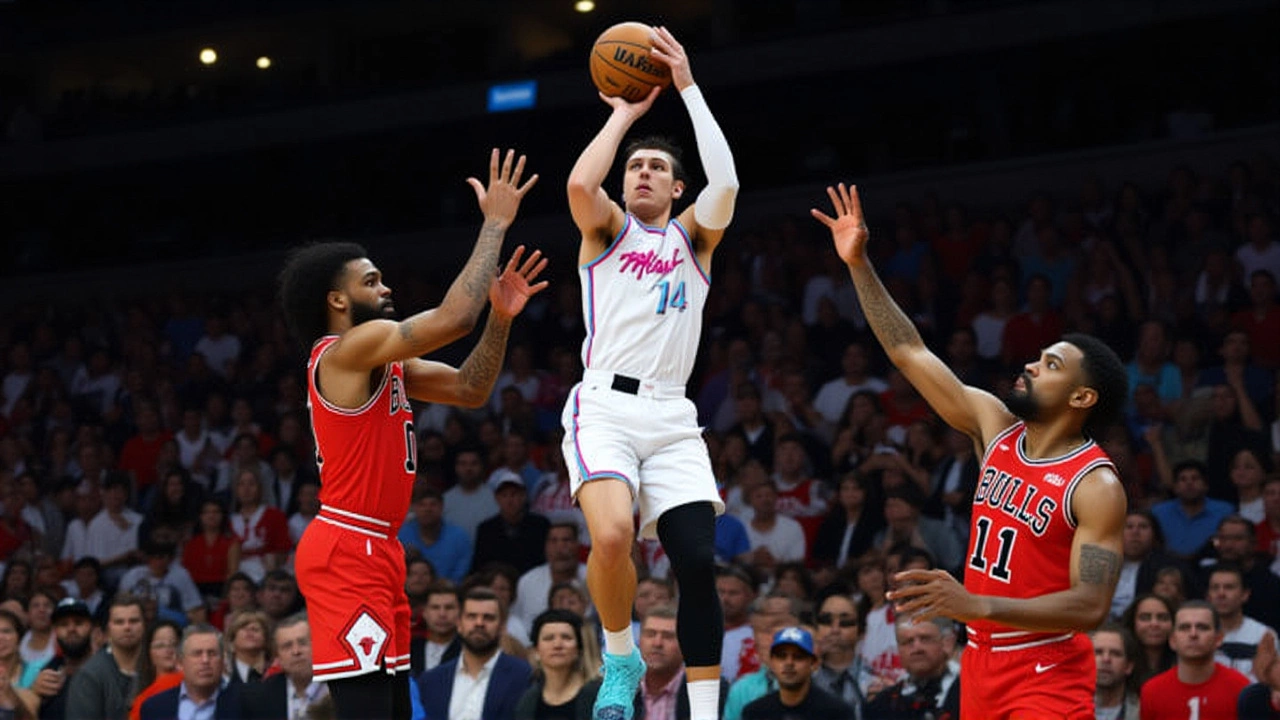The Miami Heat didn’t just beat the Chicago Bulls—they dismantled them. On Friday, November 21, 2025, at the United Center in Chicago, the Heat rolled to a stunning 143-107 victory in an Emirates NBA Cup group stage game, turning what was supposed to be a tight East Group C clash into a one-sided exhibition. The win improved Miami’s overall record to 10-6 and 2-1 in Cup play, while Chicago slumped to 8-7 and 1-2, suffering their most lopsided loss of the season. And the man who sparked it all? Kel'el Ware, the 21-year-old Heat center, who dropped 20 points and 14 rebounds like he was playing pickup in the driveway.
A Turnaround That Broke the Game Open
Chicago started strong, sprinting out to an 18-11 lead in the first five and a half minutes. Fans at the United Center, still buzzing from the Bulls’ narrow win over Charlotte two nights prior, thought they were in for a classic. But then, something shifted. Miami’s defense tightened. Their ball movement became surgical. And suddenly, the Heat went on a 53-21 run that lasted nearly 14 minutes—spanning the rest of the first half and into the third quarter. By halftime, they led 82-57. The lead never dipped below 14 after that. At one point, it ballooned to 41 points—the second-largest margin of the season for Miami and the biggest deficit Chicago had ever endured in 2025-26. It wasn’t just Ware. Norman Powell added 19 points, Bam Adebayo chipped in 18, and guards Pelle Larsson and Davion Mitchell each scored 16. Miami shot 58% from the field, drained 17 three-pointers, and had 34 assists. They were efficient, explosive, and utterly unguardable.Chicago’s Fight, and Then the Frustration
For Chicago, Ayo Dosunmu was the lone bright spot, dropping 23 points and hitting three threes while dishing out four assists. Josh Giddey nearly notched a triple-double with 19 points, 11 rebounds, and nine assists. Jalen Smith added 14 off the bench. But the Bulls’ bench was outscored 48-19. And then came the turning point no one saw coming. Midway through the third quarter, Kevin Huerter, Chicago’s shooting guard, erupted after a foul call. He waved his hand at the ball—clearly frustrated—as it bounced off the referee’s leg. Referee Che Flores immediately assessed a technical. Then, after a brief conversation with the officiating crew, Huerter was ejected. The crowd fell silent. The momentum, already tilted, flipped completely. Miami went on a 12-2 run immediately after. It wasn’t just a loss—it felt like a collapse.
Why This Game Matters Beyond the Box Score
The Heat’s 143 points? That’s the fourth time this season they’ve cracked 140. Four. In one season. They’d only done that twice in the previous seven seasons combined. That’s not a hot streak—it’s a transformation. Miami’s offense has gone from elite to otherworldly. They’re averaging 124.8 points per game, the best in the NBA. They’re not just scoring—they’re orchestrating. The ball moves like water. No one player dominates. Everyone contributes. For Chicago, this loss stings on multiple levels. They’re now fourth in East Group C, half a game behind the Knicks and Hornets. With Milwaukee sitting at 2-0, and Miami at 2-1, the race for the top two spots—those that advance to the knockout round—is tightening. The Bulls’ next game? A home matchup against New York. A must-win. But after this? Confidence is frayed.What’s Next for Both Teams
Miami’s next test is a road trip to face the Milwaukee Bucks—the only team in the group with a perfect record. If the Heat can win that one, they’ll take over Group C. They’ve got the firepower. Now they need the poise. Chicago, meanwhile, faces a do-or-die scenario. Lose to the Knicks, and they’re likely out of Cup contention. Win, and they stay alive—but only barely. The pressure is mounting. Coach Billy Donovan’s rotations are under scrutiny. And the question hanging over the locker room: Is this just a bad night… or a sign of deeper issues?
The Bigger Picture: The NBA Cup’s Growing Influence
Now in its second season, the Emirates NBA Cup is no longer a novelty. It’s a catalyst. Teams are treating group stage games like playoff prep. The prize money—$1 million for the winner—isn’t the only draw. It’s the momentum. The visibility. The chance to build chemistry in high-stakes games before the real grind begins in January. For Miami, this win isn’t just about Cup standings. It’s proof they’ve found something special. Ware, a second-year player who was barely a rotation guy last season, is now a double-double machine with 21 blocks on the year. Adebayo is playing with renewed energy. Powell, acquired mid-last-season, is becoming the glue. For Chicago? They’re still searching for their identity. Dosunmu is a warrior. Giddey is gifted. But they need more. Much more.Frequently Asked Questions
How did Kel'el Ware’s performance compare to other young centers in the NBA this season?
Ware’s 20-point, 14-rebound game against Chicago was his sixth double-double in the last eight contests. Among players under 22, only Victor Wembanyama has more double-doubles this season (8), and no other center has matched Ware’s efficiency—72% field goal shooting, 2.6 blocks per game, and a 21.5 player efficiency rating. He’s becoming the defensive anchor Miami didn’t know it needed.
Why is Miami’s 143-point game historically significant?
The Heat had only recorded two 140+ point games in the entire seven-year span from 2018-19 to 2024-25. This season alone, they’ve done it four times—including three in November. Only the Denver Nuggets (5) and Oklahoma City Thunder (4) have matched or exceeded that total. It signals a shift in Miami’s offensive philosophy: more pace, more spacing, and more trust in role players to create.
What impact did Kevin Huerter’s ejection have on the Bulls’ morale and strategy?
Huerter was Chicago’s third-leading scorer and their most reliable perimeter defender. His ejection forced the Bulls to play with only eight healthy rotation players for the final 14 minutes. Coach Donovan had to insert rookie Julian Strawther, who hadn’t played more than 12 minutes in a game all season. The defensive gaps widened, and Miami exploited them with 11 straight open threes in the fourth quarter. It wasn’t just a personnel loss—it was a psychological one.
How does this result affect the NBA Cup standings in East Group C?
After the win, Miami sits at 2-1 in Cup play, half a game behind the 2-0 Milwaukee Bucks. The New York Knicks and Charlotte Hornets are also 2-1 and 1-2, respectively. Chicago now trails all three teams, putting them on the brink of elimination. Only the top two teams in the group advance to the knockout round. With two games left, the Bulls must win both to have any chance—and even then, they’ll need help from other results.
Is the NBA Cup becoming as important as the regular season for teams like Miami?
For Miami, yes. The Cup games are now treated as high-leverage matchups. Coaches use them to test lineups, evaluate young players under pressure, and build momentum heading into December. With $1 million on the line and TV exposure soaring, teams are no longer treating it as a sideshow. The Heat’s front office has already signaled that Cup success could influence playoff rotation decisions—especially for players like Ware and Larsson.
What’s the outlook for the Bulls’ season after this loss?
Chicago’s playoff hopes are still alive, but they’re slipping. At 8-7, they’re just outside the Eastern Conference’s top eight, and their net rating has dropped to -1.2 since November 1. The Bulls need consistency—something they haven’t shown since early October. Without a true second scorer beside Dosunmu and better defensive discipline, they risk falling into the play-in tournament. This loss exposed their fragility. Now, they need answers—fast.
